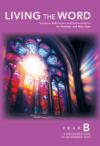Scripture Study for
Fourth Sunday of Advent
Micah 5:1–4a / Psalm 80:4 / Hebrews 10:5–10 / Luke 1:39–45
<< Back to LECTIONARY RESOURCES
Understanding the Word
By Br. John R. Barker, OFM
The prophet Micah, along with Isaiah and other prophets, expected that one day God would raise up a righteous ruler in the line of David. (Before the end of the monarchy, a long line of “bad kings” gave rise to this hope. Later, this hope remained alive after the destruction of the monarchy.) David’s ancestral home was the insignificant and tiny Bethlehem, which was part of the clan of Ephrathah (Ruth 1:2; 1 Samuel 17:12). Davidic rulers were representatives of God and thus the ideal ruler would be a righteous and caring shepherd of God’s people, protecting them against foreign and domestic enemies that threatened their well-being and peace. As such, the Davidic ruler is the agent of God’s own care for the people in times of weal or woe.
In his exploration of what God has accomplished in Christ, the author of the Letter to the Hebrews draws extensively on the Jewish scriptures to make the case that Jesus has been sent to fulfill God’s will completely and perfectly. Here the author draws on the Greek version of Psalm 40 to argue that Jesus came into the world (with a body) to do away with inadequate sacrifices and replace them with the sacrifice of his own body, thus accomplishing perfectly God’s will: behold, I come to do your will. This will is not specifically that Jesus should sacrifice himself, but that through his sacrifice all people would be “consecrated” to God in him.
An overarching theme throughout all of scripture is the divine desire that human beings learn to be able to trust in God, specifically that God has their welfare in mind and desires what is good for them, all of them as individuals and as a single people. This trust also entails believing God’s promises of future blessedness for all of creation. Such trust, or faith, is difficult for humans to “achieve,” which is why God and then Jesus emphasize it so much. It is not surprising, then, that Elizabeth rejoices that Mary believed—trusted—that what God had announced to her would come to pass. It is Mary’s trusting faith that prepares her to give birth to God’s Messiah.
